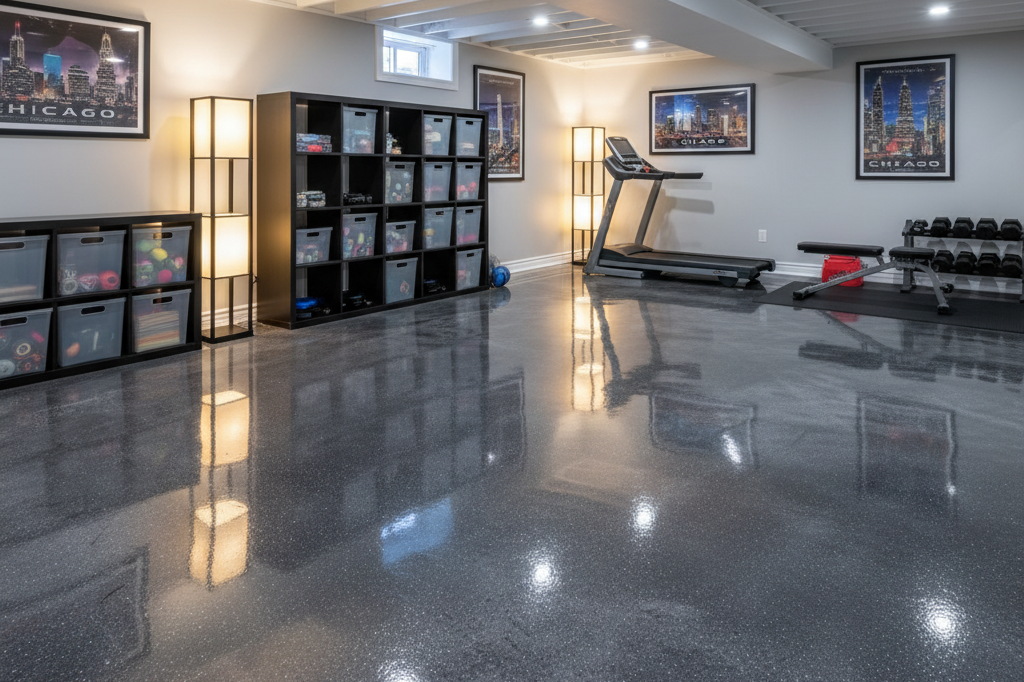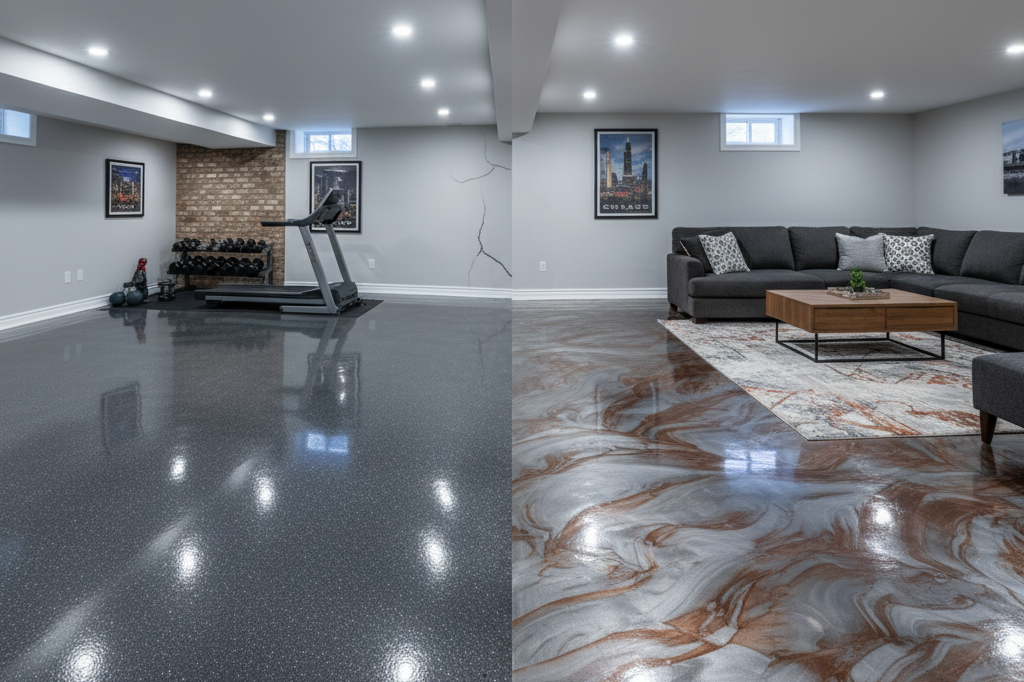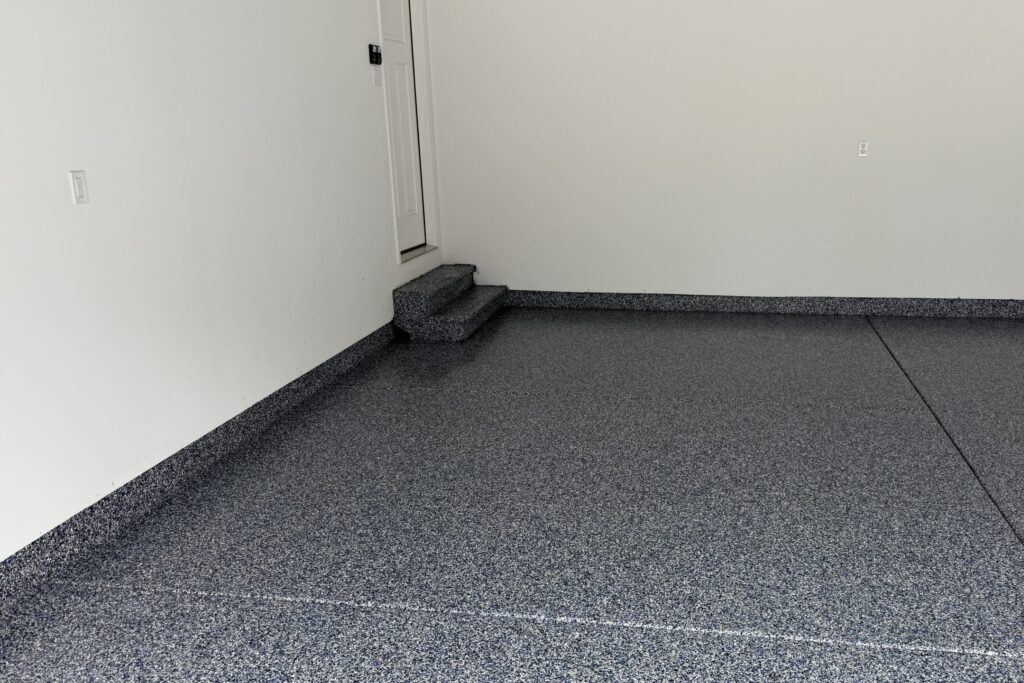If you’re like most Chicago homeowners, your garage floor probably takes a beating year-round. From winter road salt and slush to oil drips and everyday wear, bare concrete doesn’t stand much of a chance. Cracks, stains, and uneven surfaces are more than just an eyesore—they’re signs that your garage floor needs some serious attention.
That’s where garage floor coating comes in.
Whether you’re looking to upgrade your space for durability, style, or resale value, applying a protective coating can completely transform your garage. And in a city like Chicago—where extreme weather is the norm—it’s more than just a cosmetic upgrade. It’s a practical investment in your home.
In this guide, we’ll break down everything you need to know about garage floor coatings, including what they are, how they work, what they cost in the Chicago area, and why epoxy flooring is one of the most popular solutions. You’ll learn about the benefits, the process, and how to choose the best option for your needs—whether you’re turning your garage into a showroom, a workshop, or just want it to look a little less beat up.
So if you’re ready to ditch the dusty, cracked concrete and give your garage a much-needed upgrade, you’re in the right place. Let’s dive in.
What Is Garage Floor Coating and Why Does It Matter?

A garage floor might seem like one of those things that doesn’t need much attention—until it starts cracking, staining, or becoming slippery every time it rains. That’s when homeowners start searching for something more durable, more protective, and frankly, more attractive. Enter garage floor coating.
At its core, garage floor coating is a protective layer applied over your existing concrete floor. It’s designed to shield your garage from all the things that normally wear it down—like oil spills, water, road salt, dropped tools, and heavy car traffic. But it’s not just about protection. Coatings also improve the way your garage looks, making the space feel cleaner, brighter, and more polished.
There are a few different types of coatings, but garage floor epoxy is by far one of the most popular. It’s strong, long-lasting, and available in a wide range of colors and finishes, from sleek gloss to decorative flakes. If you’ve ever walked into a garage that looked like a high-end showroom—that smooth, shiny surface was probably an epoxy floor.
More than just cosmetic, these coatings create a non-porous surface that resists moisture, stains, and even bacteria. That means easier cleanups and less worry about long-term damage.
So why does it matter? Because in a city like Chicago, where temperature swings and harsh winters are the norm, your garage floor goes through a lot. A proper garage floor coating not only protects your space from weather-related wear and tear, but also adds value, safety, and a whole lot of curb appeal to your home.
Why Chicago Garages Are Prime Candidates for Epoxy Floor Systems
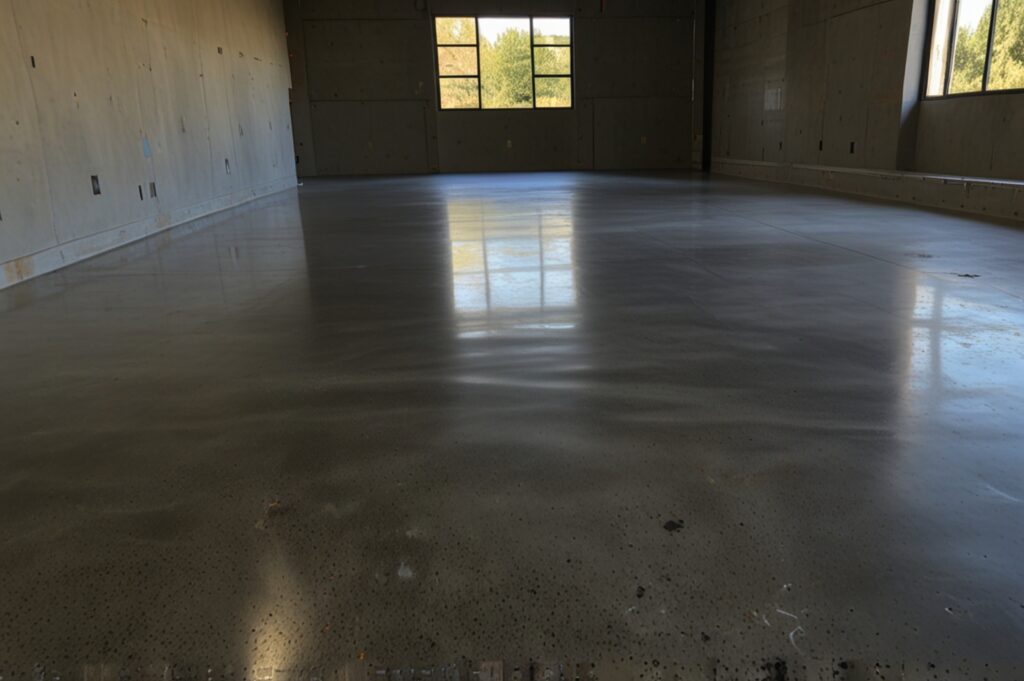
If you live in Chicago, you already know your garage sees more than just parked cars. It’s your winter staging area, your weekend workshop, your sports gear drop zone—and sometimes your home’s unofficial front door. That’s a lot of traffic and even more wear. And that’s exactly why an epoxy floor makes so much sense.
Chicago’s climate is tough on concrete. Between freezing winters, thawing springs, and humid summers, your garage floor goes through a constant cycle of expanding, contracting, and soaking up moisture. Add in road salt from winter driving, rainwater, mud, and oil spills, and it’s no surprise that untreated concrete in this city doesn’t last long.
An epoxy floor solves that problem by acting as a durable, sealed barrier between your concrete and everything the Midwest throws at it. It protects against moisture, resists chemical stains, and keeps salt from eating into the surface. And since epoxy is non-porous, you won’t have to worry about cracks forming from water creeping in and freezing during those icy Chicago nights.
But function is only half the story. An epoxy garage floor also looks fantastic. Whether you prefer a clean, high-gloss finish or a decorative flake texture for added grip, epoxy gives your garage a sleek, professional appearance that’s easy to maintain. No more dusty, dull floors—just a bright, polished surface that holds up to daily use.
So if your garage floor is showing signs of wear—or you simply want to protect it before the damage starts—an epoxy floor is a smart, long-term solution that fits perfectly with Chicago living. It’s tough, stylish, and built to handle everything our city throws its way.
How Much Does Garage Floor Coating Cost in Chicago?
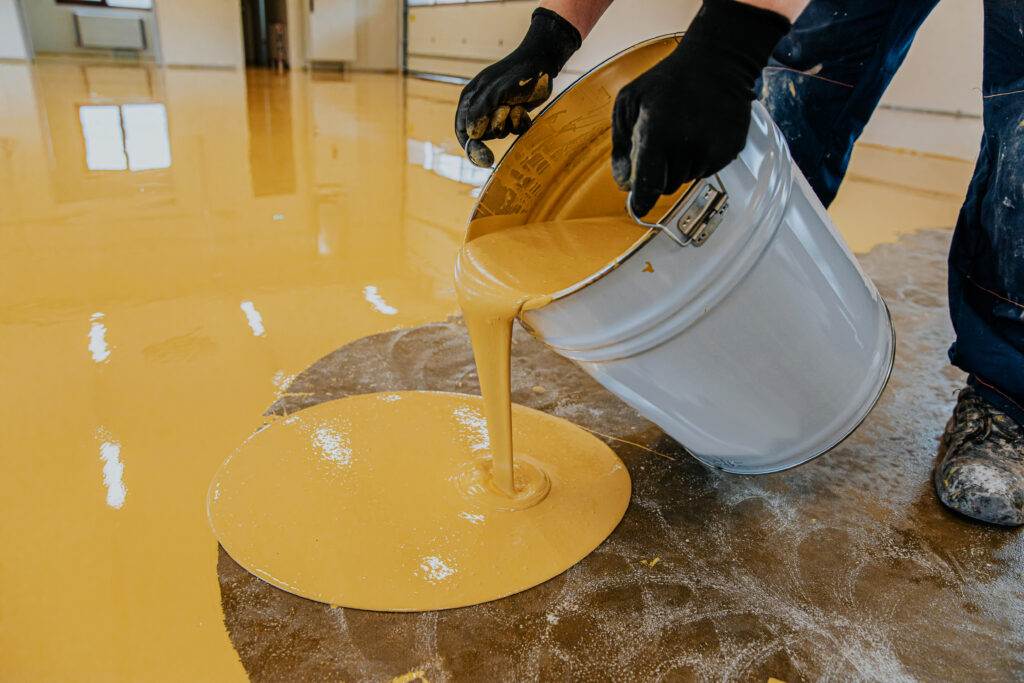
Let’s get down to what most homeowners are really wondering: how much is this going to cost me? The good news is that garage floor coating is more affordable than many people think—especially when you consider the long-term protection and value it adds to your home.
In the Chicago area, the average cost of a professional garage floor coating ranges from $4 to $9 per square foot. For a standard two-car garage, you’re typically looking at $1,200 to $3,000, depending on a few key factors.
Here’s what can influence the price:
- The condition of your existing concrete – If your floor has cracks, oil stains, or needs grinding, prep work will increase the cost.
- Type of coating system – A basic one-layer application will cost less than a multi-layer system with decorative flakes and a UV-resistant topcoat.
- Customization – Want metallic finishes or high-end textures? These options cost more but also make your floor look like something out of a car showroom.
- Size of your garage – Naturally, larger garages mean more material and labor.
You might also be tempted to go the DIY route, and yes, you’ll find kits at your local hardware store for under $300. But the truth is, garage floor coatings—especially epoxy systems—are tricky to install without the right tools and prep work. Many homeowners end up redoing it (or hiring pros to fix it) within a year. A properly installed garage floor coating by professionals is far more durable and visually impressive.
In a city like Chicago, where your garage battles snow, salt, and temperature swings, investing in a high-quality coating is well worth the price. It’s one of those upgrades that pays off every time you pull into your garage.
Step-by-Step: What the Garage Floor Coating Process Looks Like

If you’ve never had your garage floor coated before, the process might seem a little mysterious—but it’s actually pretty straightforward when done by professionals. A well-installed epoxy flooring system doesn’t just happen with a roller and a weekend. It involves a few key steps that make all the difference between a surface that lasts years and one that peels after the first winter.
Here’s what the typical garage floor coating process looks like:
1. Surface Preparation
This is the most important (and most overlooked) step. The floor is cleaned thoroughly, and any oil stains or old coatings are removed. If there are cracks or pits in the concrete, they’re patched and leveled. Most pros also mechanically grind the surface to open up the pores, which helps the epoxy flooring bond properly.
2. Priming and Base Coat
Once the surface is prepped, a primer or base layer of epoxy is applied. This acts as the foundation, sealing the concrete and creating the first barrier against moisture and wear.
3. Optional Flake or Quartz Layer
Many homeowners choose to add colored flakes or quartz granules to the wet base coat. This adds texture, slip resistance, and visual depth. Plus, it hides dirt and imperfections really well—perfect for high-use garages in Chicago.
4. Topcoat Application
Finally, a clear topcoat is applied to seal everything in. This layer adds UV protection, chemical resistance, and that signature epoxy shine that makes your garage look polished and professional.
5. Curing Time
After the application, you’ll need to wait at least 24 hours before walking on the floor—and usually 72 hours before driving on it. In humid or cold Chicago weather, curing might take a bit longer, which is why timing the project right matters.
When installed correctly, epoxy flooring transforms your garage from a dull, dusty space to a clean, durable, and great-looking part of your home.
Also read: Epoxy vs. Polyaspartic: The Ultimate Showdown for Garage Floor Coatings
Choosing the Right Epoxy Floor for Your Garage

Not all epoxy floors are created equal—and if you’re thinking about upgrading your garage, it’s important to choose a system that fits both your lifestyle and the conditions of your space. From basic coatings to multi-layer systems with decorative finishes, there’s a garage floor epoxy solution for just about every need and budget.
Start by thinking about how you use your garage. If it’s mostly for parking cars and storing tools, a solid color epoxy with a standard topcoat may be all you need. It’s simple, clean, and gets the job done. But if your garage doubles as a home gym, workshop, or hangout space, you might want to explore more decorative options—like epoxy with flake blends or metallic finishes.
Then consider performance. Chicago garages see a lot of moisture, salt, and heavy traffic. If durability is your top concern, go with a multi-layer garage floor epoxy system that includes a moisture-blocking primer, decorative chips, and a UV-resistant topcoat. This setup will hold up against the harshest winters and everyday wear without fading, peeling, or cracking.
You’ll also want to think about texture. Glossy epoxy looks great, but it can get slippery when wet. Many installers offer non-slip additives or flake systems that add traction while still looking polished.
Finally, don’t be afraid to ask for samples or color mockups. Professional epoxy flooring installers often have portfolios or physical swatches to help you visualize how different options will look in your space.
At the end of the day, the right garage floor epoxy is one that matches your goals, holds up to Chicago’s challenging weather, and transforms your garage into a cleaner, safer, and better-looking part of your home.
Your Garage Floor Deserves a Serious Upgrade
From battling Chicago’s unpredictable weather to standing up to daily wear and tear, your garage floor takes more abuse than most surfaces in your home. The good news? You don’t have to live with cracks, stains, or a dull, dusty space. With the right garage floor coating, you can protect your concrete, improve your garage’s appearance, and even boost your home’s value.
We’ve walked through the basics—from what garage floor coating is and why it’s especially important in Chicago, to the cost, the process, and how to choose the best epoxy system for your needs. Whether you’re looking for something durable, stylish, or both, there’s a solution out there that can completely transform your garage.
Now’s the perfect time to take the next step. If your garage floor is showing signs of wear—or you’re just ready for a cleaner, more professional-looking space—reach out to a local epoxy flooring expert. Get a quote, ask questions, and explore your design options. You might be surprised at how simple and impactful this upgrade can be.
Want to learn more about protecting your home from the ground up? Check out our related guides on flooring, home maintenance, and seasonal prep for Chicago homes. Your garage is more than just a place to park—it’s part of your home, and it deserves just as much care.

